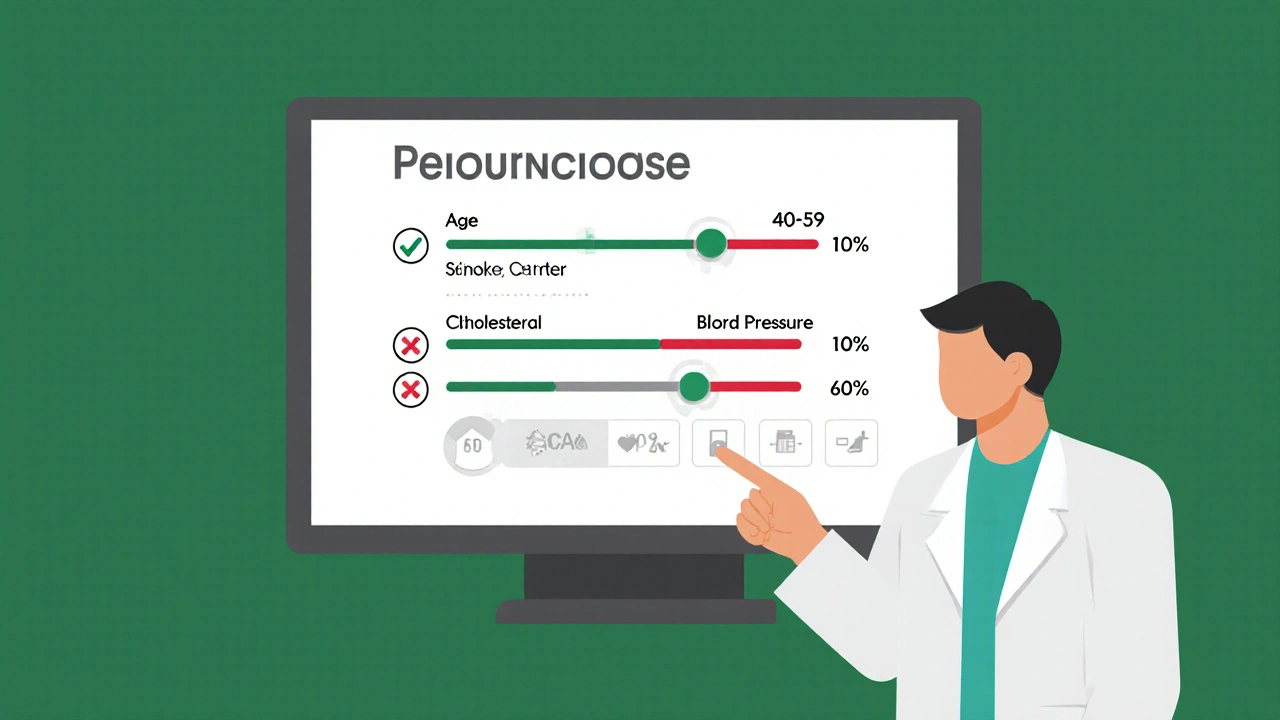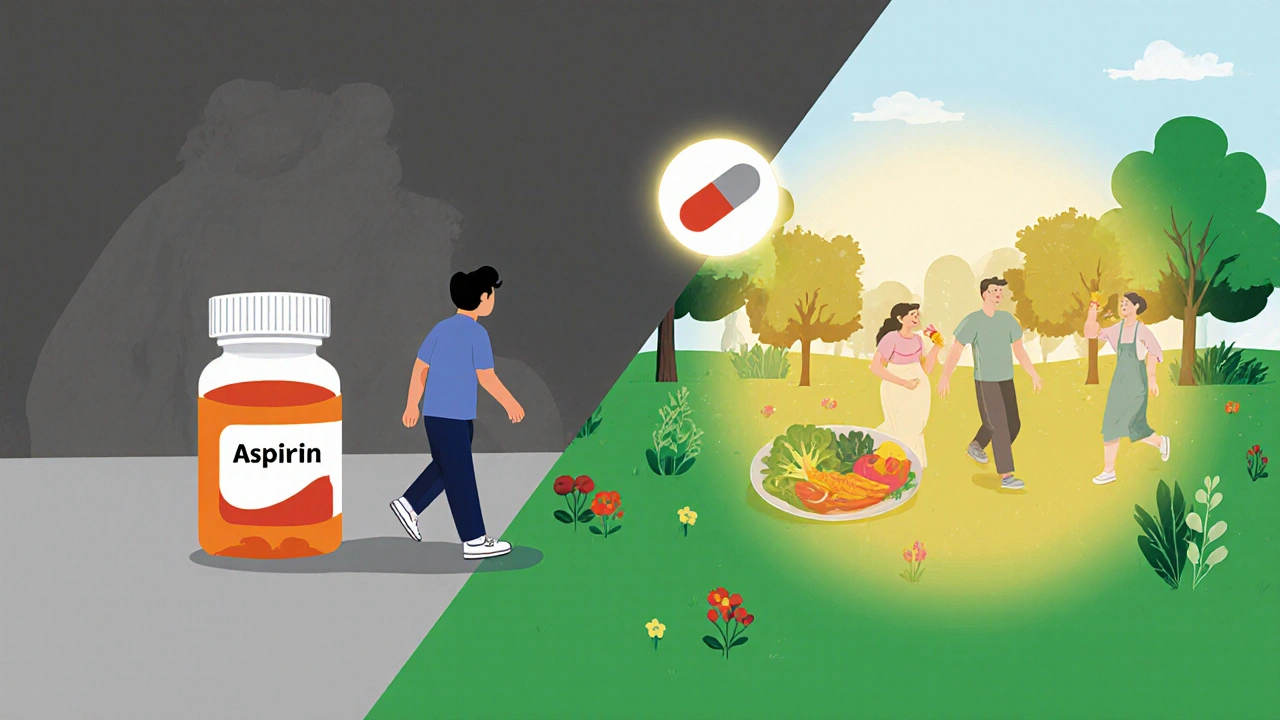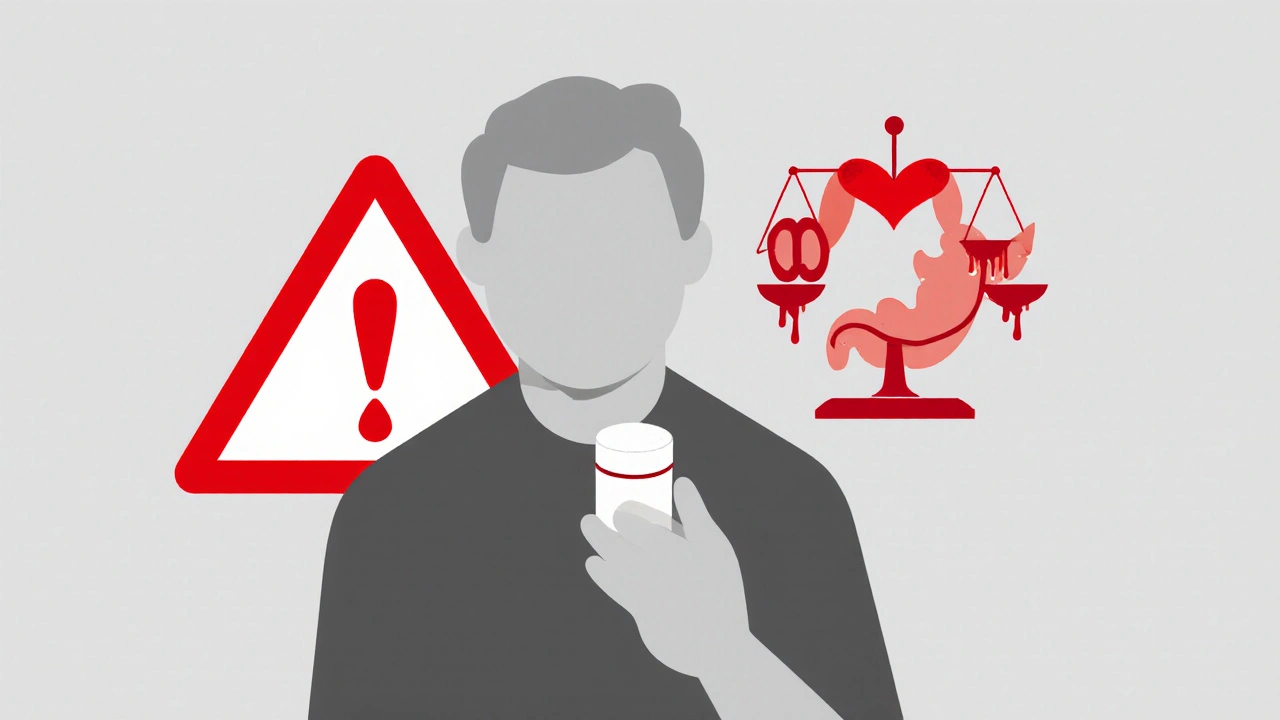Aspirin Isn’t for Everyone Anymore - Here’s Who Still Needs It
For decades, popping a daily low-dose aspirin was as common as brushing your teeth if you wanted to avoid a heart attack. Many people over 50 took it without a second thought - especially if a parent had heart disease. But the rules changed. In 2022, major health groups updated their guidelines, and now, aspirin therapy is no longer a one-size-fits-all solution for heart disease prevention. In fact, for most healthy adults, it does more harm than good.
The reason? Aspirin reduces blood clotting by blocking platelets. That sounds helpful - until you realize it also increases your risk of dangerous internal bleeding. A 2022 review of 11 major studies involving over 134,000 people found that while aspirin slightly lowered the chance of a nonfatal heart attack or stroke, it increased the risk of major bleeding by 43%. For many, that trade-off isn’t worth it.
Who Should Still Consider Aspirin?
The new guidelines don’t say never take aspirin. They say: only if you’re at high enough risk of heart disease - and low enough risk of bleeding. That narrow window applies mostly to adults aged 40 to 59.
First, calculate your 10-year risk of cardiovascular disease using the ACC/AHA Pooled Cohort Equation. This tool looks at:
- Your age
- Sex
- Race
- Total and HDL cholesterol
- Systolic blood pressure (whether you’re on medication or not)
- Whether you have diabetes
- Whether you smoke
If your calculated risk is 10% or higher, and you have no major bleeding risk factors, then aspirin might be worth discussing with your doctor. For example, a 55-year-old man with high cholesterol, untreated high blood pressure, and a 20-pack-year smoking history might benefit. But if you’re 58, have normal cholesterol, no diabetes, and don’t smoke? The odds of you avoiding a heart attack with aspirin are so low, it’s not worth the bleeding risk.
Age 60 and Older? Skip It - Unless Your Doctor Says Otherwise
For people 60 and older, the U.S. Preventive Services Task Force (USPSTF) now recommends against starting aspirin for primary prevention. Why? Because bleeding risk rises sharply with age, while the benefit of preventing a first heart attack shrinks. Studies like ASPREE showed that in adults over 70, aspirin didn’t prevent heart attacks or extend life - but it did cause more hospitalizations from bleeding.
Even if you’ve been taking aspirin for years, stopping isn’t dangerous. There’s no rebound effect. If you’re 65, have no history of heart disease, and were told to take it because your dad had a heart attack - that’s not enough reason anymore. Family history matters, but modern medicine has better tools: statins, blood pressure control, and lifestyle changes reduce your risk far more effectively than aspirin.
Diabetes Changes the Math - But Not as Much as You Think
People with diabetes are often told to take aspirin because they’re at higher risk for heart disease. The American Diabetes Association still says it “might be considered” for those over 40 with additional risk factors. But even here, the evidence is weak.
A 2018 study called ASCEND followed over 15,000 diabetic patients. Half took aspirin daily. After seven years, aspirin reduced heart attacks and strokes by about 12%. But it also increased major bleeding by 29%. That means for every 100 diabetic patients taking aspirin for 10 years, only one avoided a heart attack - while two had a serious bleed.
So if you have diabetes and are over 60, the odds are still against aspirin. If you’re younger, under 60, with well-controlled blood sugar, no kidney disease, and no history of ulcers, then a low-dose aspirin might still be considered. But it’s not automatic. Talk to your doctor - don’t assume.

Bleeding Risk: The Hidden Danger
Aspirin doesn’t just cause stomach bleeds. It can cause brain bleeds, bleeding in the intestines, or even severe nosebleeds that require emergency care. Your bleeding risk goes up if you:
- Have had a stomach ulcer or GI bleed in the past
- Take NSAIDs like ibuprofen or naproxen regularly
- Drink alcohol three or more times a week
- Have kidney or liver disease
- Take blood thinners like warfarin or apixaban
- Are over 65
Doctors use a tool called HAS-BLED to score bleeding risk. A score of 3 or higher means you’re at high risk - and aspirin should be avoided. Even a single past ulcer or regular use of Advil can push you into the danger zone.
What About Secondary Prevention?
There’s one group where aspirin still saves lives: people who already had a heart attack, stroke, stent, or bypass surgery. For them, aspirin reduces the chance of a second event by 21% and lowers death risk by 13%. This is called secondary prevention - and it’s not controversial.
If you’ve had a heart event, your doctor will almost certainly recommend lifelong low-dose aspirin (usually 75-100 mg daily). That’s different from using it to prevent a first event. Don’t confuse the two. The guidelines only changed for people without existing heart disease.
Why Did Everything Change?
Thirty years ago, heart disease was more common, and we didn’t have statins. Today, most people with high cholesterol take a statin - which lowers heart attack risk by 25-37%. Blood pressure is better controlled. Smoking rates are down. Diabetes management is more precise. All of this means the baseline risk for heart disease is lower than it used to be.
Aspirin only reduces risk by 10-15%. When you stack that against the 25-37% benefit of statins - and the 43% increased bleeding risk - aspirin doesn’t look so good. Experts like Dr. John Rumberger at Mayo Clinic say: “The window for aspirin’s utility in primary prevention has narrowed considerably.”

What Should You Do Now?
If you’re taking aspirin daily and don’t have heart disease:
- Don’t stop cold turkey without talking to your doctor - but do schedule a conversation.
- Ask: “What’s my 10-year heart disease risk?” Get the numbers.
- Ask: “Do I have any bleeding risk factors?”
- Ask: “Is aspirin still right for me based on current guidelines?”
If you’re under 40, skip it. No benefit. High risk. If you’re 40-59 with low risk? Skip it. If you’re 60+? Don’t start. If you’re 60+ and already taking it? Ask if you should stop. Most people can - and should.
Instead of aspirin, focus on what actually works: exercise, not smoking, eating vegetables, managing blood pressure and cholesterol, and taking a statin if your doctor recommends it. These reduce your heart attack risk far more than aspirin ever did.
What About Natural Alternatives?
Some people turn to fish oil, turmeric, or garlic thinking they’re “natural aspirin.” But none have the same proven effect on platelets. And fish oil doesn’t prevent heart attacks in healthy people - it’s not a substitute. Don’t replace medical advice with supplements.
The only proven, effective, low-cost, evidence-backed tools for preventing heart disease are: statins, blood pressure meds (if needed), and lifestyle changes. Aspirin is not one of them - unless you’re in the small group where the math still works.
Should I take aspirin every day to prevent a heart attack?
Only if you’re between 40 and 59, have a 10% or higher 10-year risk of heart disease, and no major bleeding risks. For most people - especially those over 60 - the bleeding risk outweighs any benefit. Don’t take it without talking to your doctor.
I’ve been taking aspirin for years. Should I stop?
If you have no history of heart attack, stroke, or stent, and you’re over 60, you should consider stopping. There’s no rebound effect - stopping is safe. Talk to your doctor first, but don’t assume it’s still helping you. For most, it’s not.
Is baby aspirin safer than regular aspirin?
Yes - but only in dose, not in overall safety. Baby aspirin is 81 mg, which is the standard low dose used for heart prevention. But even at 81 mg, it still increases bleeding risk. The problem isn’t the dose - it’s that for most healthy people, there’s no benefit to offset that risk.
Does family history mean I need aspirin?
Family history raises your risk, but it’s not enough to justify aspirin on its own. Your actual risk depends on your cholesterol, blood pressure, smoking status, and diabetes. A parent’s heart attack at 58 doesn’t mean you need aspirin - it means you should get your numbers checked and focus on statins and lifestyle changes.
Can I take aspirin if I have high blood pressure?
Only if your blood pressure is well-controlled (under 140/90). Uncontrolled high blood pressure increases the risk of brain bleeding when taking aspirin. If your BP is still high, focus on getting it under control before even considering aspirin.
What’s the best alternative to aspirin for heart health?
Statins. If you’re at risk for heart disease, a statin reduces your risk by 25-37% - far more than aspirin’s 10-15%. Combine that with regular exercise, not smoking, and eating more vegetables and less processed food. These are proven, powerful, and safe. Aspirin doesn’t come close.
Bottom Line: Aspirin Is Not a Magic Bullet
Aspirin was once seen as a simple, cheap shield against heart disease. Now we know it’s a tool - and like any tool, it only works in the right hands, for the right person. For most healthy adults, it’s no longer a shield - it’s a liability.
If you’re 40-59 and your 10-year heart disease risk is above 10%, talk to your doctor about whether aspirin might still help. But if you’re over 60, have no heart disease history, or have any bleeding risk - stop taking it. Your body doesn’t need it. And it might be hurting you more than helping.
The real heart disease prevention strategy isn’t a pill. It’s knowing your numbers, managing your blood pressure and cholesterol, staying active, and avoiding tobacco. That’s what saves lives. Not aspirin. Not anymore.


Written by Felix Greendale
View all posts by: Felix Greendale